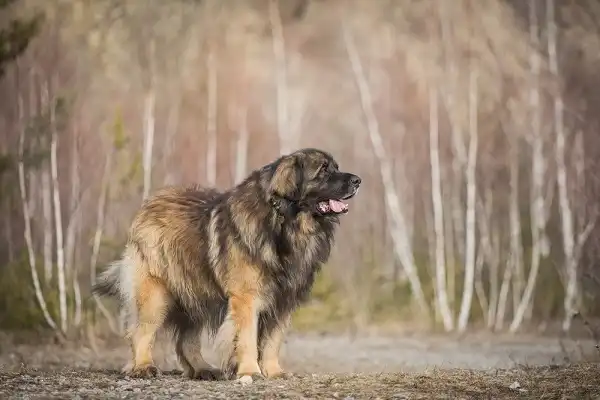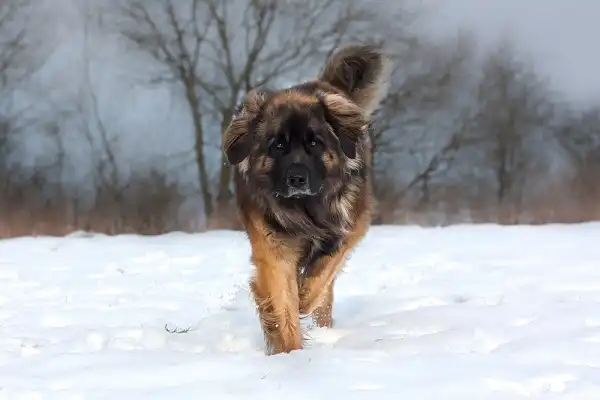Are you looking for a large and lovable breed of dog that is intelligent and easy to train? Consider the Leonberger. This giant, loyal dogs have been bred since 1846 in Germany as companions to families, businessmen, farmers, and anyone else who needs a big-hearted furry friend by their side. They are known for being smart, gentle but alert guardians with plenty of strength. With their upright character and regal bearing plus luxurious coats, caring for a Leonberger can be a rewarding experience – both mentally and physically!

Leonberger Description
The Leonberger is a majestic and strikingly beautiful breed of dog hailing from Germany. They are renowned for their impressive size. Despite their intimidating stature, Leonbergers are famously gentle giants who are wonderful family companions and excel in therapy work due to their calm and loving demeanor. One of the distinguishing characteristics of the Leonberger is their luxurious double coat, which is typically a golden-yellow color with black on the tips of the fur. Their coat is water-resistant, thanks to the dense undercoat, and requires regular grooming to keep it in top condition. Given the size of the breed, it is important to ensure that they receive regular exercise and mental stimulation to keep them happy and healthy.
Leonberger Habitat
The Leonberger breed is adaptable to a variety of living environments, including urban settings and rural areas. However, due to their large size, they require ample space to move around and exercise. A home with a yard or access to open spaces is ideal for this breed. Leonbergers are known for their love of water, and they enjoy spending time swimming and playing in lakes and rivers. They are also capable of handling cold weather conditions due to their double coat, which provides insulation and protection against the elements. In terms of temperature, Leonbergers prefer cooler climates and are sensitive to extreme heat. It is important to provide them with plenty of shade and fresh water during the hot summer months. While they are adaptable to different living environments, Leonbergers thrive on human interaction and companionship. They are well-suited for families with children and make excellent therapy dogs due to their calm and gentle temperament.
Leonberger Diet
The Leonberger breed requires a healthy and balanced diet to maintain its overall well-being. As a large and active breed, they have a higher caloric requirement than smaller dogs. It is important to feed them high-quality food that is rich in protein and essential nutrients. Commercial dry kibble or wet food formulated for large breeds can be a good choice for Leonbergers. However, it is important to choose a brand that does not contain fillers or additives, which can be harmful to their health. Instead, opt for a commercial dog food that includes real meat as the primary ingredient, along with fruits, vegetables, and whole grains. In addition to commercial dog food, Leonbergers can also benefit from a diet that includes fresh foods such as lean meats (chicken, turkey, beef), fish, and vegetables. Fresh or cooked protein can be offered as a supplement to commercial kibble or wet food.

Leonberger Size
The Leonberger is considered a giant breed and typically weighs between 70-150lbs (32-68kg) with males generally being larger than females. They stand at a height of 26-31 inches (66-79cm) at the shoulder and have a large, muscular build that resembles that of a lion. Their double coat consists of medium to long-length fur with an undercoat that helps protect them from the elements. Leonbergers come in various colors such as black, brown, yellow, red, cream, and white; however the most common coloring is yellow or golden. The fur may be solid or feature patchwork markings of different colors. Although they are considered a giant breed, Leonbergers are quite agile and have powerful hindquarters that enable them to move with impressive speed. In fact, they often surprise their owners with their athleticism and grace.
Leonberger Lifespan
The Leonberger breed has a relatively short lifespan, typically living between 8 to 9 years. However, with proper care and attention, some Leonbergers have been known to live up to 10 years. Several factors can affect Leonberger’s lifespan, including their diet, exercise routine, and overall health. It’s crucial to provide them with regular veterinary care, including check-ups and vaccinations, to ensure they remain healthy and free from disease. Leonbergers are prone to certain health conditions that can affect their lifespan, including hip dysplasia, elbow dysplasia, osteosarcoma (a type of bone cancer), and bloat (gastric torsion). These conditions can cause pain, discomfort, and a decreased quality of life for the dog. Maintaining a healthy weight and avoiding excessive exercise or rough play can help prevent joint problems and other health issues that can shorten a Leonberger’s lifespan. Additionally, feeding them a well-balanced, nutrient-rich diet that meets their caloric needs can help keep them healthy and strong. Despite their relatively short lifespan, Leonbergers are cherished by their owners for their loyalty, affectionate nature, and gentle demeanor.
Leonberger Behavior
Leonbergers are known for their gentle, friendly, and jovial nature, making them excellent companions for families with children. They are protective of their loved ones and are affectionate towards their owners. With proper training and socialization, Leonbergers can get along well with other pets, making them a great addition to multi-pet households. Due to their sensitive nature and desire to please their owners, Leonbergers are easy to train. They respond well to positive reinforcement and are eager to learn new things. This breed can excel in obedience, agility, and other dog sports. Moreover, Leonbergers are intelligent dogs that possess a strong work ethic, making them ideal for tasks such as therapy work, search and rescue, and service dogs. Although Leonbergers are friendly and sociable, they can be territorial and protective of their homes and families. They may bark at strangers and can be wary of unknown visitors. However, with proper socialization and training, this instinct can be controlled, making them well-adjusted and well-behaved companions. Furthermore, Leonbergers are known for their love of water. They enjoy swimming, playing in lakes or ponds, and even enjoy taking a dip in the pool. This trait makes them excellent companions for water-loving families who enjoy outdoor activities.

Leonberger Speed
Leonbergers are large, muscular dogs who possess great strength and athleticism. This breed is known for its endurance and can reach speeds of up to 25 miles per hour when running. However, their average speed when trotting or walking is typically around 10-15 mph. The Leonberger’s energetic nature makes them capable of taking long walks or jogs with their owners, although it’s important to ensure that they don’t overexert themselves and become fatigued in the process. They may also enjoy playing outdoor sports such as fetch or frisbee, which allow them to use their agility and stamina. Additionally, Leonbergers are well-suited for activities that require strength and power, including carting, weight pulling, and agility courses. These activities allow them to burn off some of their energy while displaying their impressive strength and speed.
Leonberger Hunting
Although Leonbergers have impressive speed and agility, they are not typically used for hunting purposes. They were originally bred to be working dogs and excel in tasks such as search and rescue, herding, carting, and water rescue. The strong bond that Leonbergers form with their owners also makes them excellent therapy dogs. They can provide comfort to those suffering from physical or emotional pain or trauma with their loving personalities. Overall, the Leonberger is a loyal and devoted companion that will bring much joy to its family – whether through providing protection, participating in outdoor activities, or simply offering companionship. With careful training and socialization, they can become a cherished part of any household.
Leonbergers Common health issues
Despite the Leonberger’s large and strong build, they are prone to a variety of health problems. Common conditions that affect this breed include hip dysplasia, elbow dysplasia, eye diseases, and thyroid problems. Hip Dysplasia is a condition in which the bones of the hip joint do not fit together properly, leading to inflammation and pain in the joints. Proper nutrition, exercise, and prevention of obesity can help reduce your pet’s risk of developing this disorder. Elbow Dysplasia is another common problem affecting Leonbergers, where improper growth of the elbow joint causes pain and lameness. This condition can be managed with physical therapy or medications prescribed by your veterinarian. Eye diseases such as progressive retinal atrophy and entropion can also affect this breed. Regular eye exams by your veterinarian can help detect any issues early on and allow for appropriate treatments. Lastly, thyroid problems such as hypothyroidism can be present in Leonbergers, leading to weight gain, skin problems, and other health issues. Keeping up with regular checkups at the vet will help ensure your pet’s long-term health.

Leonbergers Training and Exercise
As with any breed of dog, it is important to properly train and socialize a Leonberger in order for them to become well-behaved adults. Early exposure to different people, environments, and situations will help them mature into confident and obedient family members. They should be taught basic obedience commands such as sit, stay, come, and heel. Additionally, early socialization with other animals can help reduce aggression or fear later on in life. Leonbergers are active dogs that require plenty of exercises in order to remain healthy and happy. Regular walks or jogs can help keep their muscles toned and provide mental stimulation through new sights and smells. Playing fetch or participating in canine sports like agility courses can also be great outlets for their energy. It is important to remember, however, that the breed’s large size and heavy coat can make them prone to overheating in warmer climates, so take extra precautions when exercising during hot summer months.
Conclusion
The Leonberger is a gentle giant that loves to be around people and can provide years of loyal companionship. They have impressive athleticism and agility, making them perfect for outdoor activities such as jogging and agility courses. Although they are not typically used for hunting, they do make excellent therapy dogs due to their loving personalities. With proper care, nutrition, exercise, and socialization your Leonberger will live a long and happy life.
Frequently Asked Question


